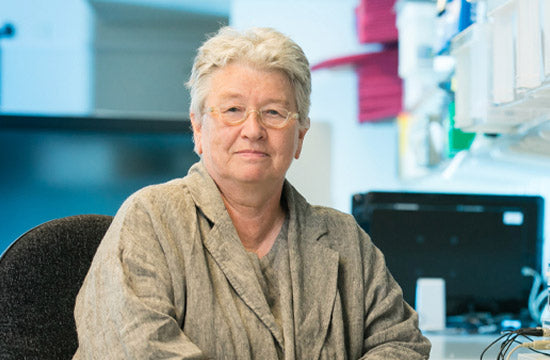Naturally Enhance Exhilaration Without Going to Extremes
Euphoria is like a drug. Everything else disappears and there’s just a feeling of limitless joy, a bliss beyond explanation.
And like a drug, its effect on the brain can be addictive.
The promise of euphoria helps prima ballerinas endure the pain. It makes marathoners keep going when the going gets tough.
It can even spur Pentecostal pastors to play with poisonous snakes.
Basically, euphoria is an intense form of pleasure. And while pleasure may seem like an ephemeral thing – secondary to basic needs – it is actually central to survival.
- Pleasure motivates and sustains interest in things we need to survive, like food, sex, and sometimes social interaction.<1>
In this guide, we will explore what euphoria is, its biological underpinnings, and how nootropics for euphoria could help you get closer to it safely and naturally.
What is Euphoria?
Euphoria is a mental and emotional state that bestows feelings of intense happiness, elation, and well-being.
It can be experienced as a transcendent state of intense joy and overwhelming contentment.
Everyone wants to feel happy, and a euphoric state can make everything seem wonderful for a while.
Euphoria melts stress away and makes us feel like the best version of our self.
Although often associated with emotions, euphoria is technically a psychological affect.
Euphoria can be stimulated by many different activities and substances with variable outcomes. Everyday pleasure can generally be induced via small amounts of reward hormones like dopamine.
But intense euphoria is harder to come by, requiring activation of the entire reward circuit at once.
Euphoric Triggers – Types of Euphoria
Various things can induce euphoria. Though seemingly unrelated, euphoric triggers share common neurochemical or neurobiological markers.
Some of the most common euphoric triggers include:
- Psychoactive drugs
- Intense physical exercise
- Play
- Music
- Dancing
- Being “in love”
- Sex
- Food
- Religious or spiritual rituals
- Meditation
- Fasting
- Asphyxia
- Sleep deprivation
- Neuropsychiatric states – mania, epilepsy, migraine, multiple sclerosis
The same brain mechanisms that facilitate euphoria also fuel its opposite. Many of the above influences can also induce depressive states. For instance, being in love can make you feel like you're in heaven, but at other times it can feel like hell.
In the same way sleep deprivation, asphyxia, gorging on food, sex, drugs, and even music can depress mood as much as it can heighten it if you go overboard.
Some neuropsychiatric conditions like bipolar disorder or dementia can swing wildly and unpredictably back and forth between euphoria and dysphoria.
Euphoria and the Brain
Affective neuroscientist Kent Berridge says euphoria is caused by the activation of hedonistic hotspots within regions of the brain’s reward circuit.
One of these hotspots operates from the medial shell – a sub-region of the nucleus accumbens within the limbic system. The nucleus accumbens signals the ventral pallidum, a second hotspot near the base of the forebrain.<2>
Stimulating these hotspots amplifies sensations of pleasure. Adding dopamine to the mix reinforces the reward aspect of pleasure to create incentive to repeat the behavior that induced a euphoric state.
The reward circuit is a group of structures that is activated when we do something rewarding like eating, having an orgasm, or taking drugs. The brain responds to the activity by releasing dopamine to brain regions along specific pathways.
Dopamine’s Role in Euphoria
The main areas associated with euphoria lie along the mesolimbic dopamine pathway, which connects the ventral tegmental area (VTA), one of the brain’s principal dopamine-producers, with the nucleus accumbens – a nucleus in the ventral striatum, an area strongly associated with motivation and reward.
During euphoria, dopamine neurons in the VTA are activated and travel down the mesolimbic dopamine pathway, boosting dopamine levels in the nucleus accumbens.
The mesocortical dopamine pathway is another major pathway in the reward system. It begins in the VTA and travels to the frontal lobes in the cerebral cortex.
Dopamine is strongly involved in euphoria, but researchers have found that it is not the actual chemical that causes pleasure, as once thought.
Dopamine neurons are activated before any actual reward is received, hence before pleasure kicks in. So dopamine seems to play roles other than causing pleasure, namely connecting a behavior with pleasure and increasing reward seeking.<3>
Nonetheless, since the mesolimbic dopamine pathway is consistently activated during euphoric experiences, it is considered the main structure of the reward system.
Medial Forebrain Bundle
The actual network of brain structures involved in mediating reward is much larger and complex than just dopamine pathways, involving many other brain regions and neurotransmitters.
Some of the most sensitive areas in the reward system lie along the medial forebrain bundle, a collection of nerve fibers that provides a route for transmitters from the dopamine-rich VTA to the lateral hypothalamus, brainstem, and basal forebrain.
Euphoria and Cognition
Motivation
Euphoria boosts activity in the mesolimbic pathway, a brain circuit driven by the neurotransmitter dopamine. Dopamine regulates positive feelings, motivation, and decision making,
Motivation is euphoria’s main job, and that’s what it does best. It spurs us to repeat rewarding behaviors. That’s beneficial when it helps us procreate, nourish our bodies, and interact with our community in a positive way.
The same motivational quality that inspires us to meet our biological needs can be channeled into other important areas of our life to improve our careers, relationships, creativity, health, emotional well-being and more.
Nootropics for euphoria can help us put that motivation to practical use and aim for the sky.
Dopamine, euphoria’s precursor, also controls sex drive, cravings, and repetitive urges.
Though euphoria does not cause addiction, its natural role as a motivator and interest amplifier can increase compulsive engagement in rewarding stimuli or reinforce the desire for addictive drugs.<4>
Nootropics for euphoria can modify the euphoria’s affect to help you keep the positive vibes and ditch the extremes that can lead to addiction and adverse consequences.
Decision Making
When researchers at Harvard Medical School and UC Berkeley studied the brains of healthy young adults, results showed a big boost in their pleasure circuitry after a missed night’s sleep.
But their study suggests the same neural pathways that arouse feelings of euphoria may also prompt risky behavior.
While euphoria may seem advantageous, it can be detrimental if you’re making impulsive decisions because you feel overly optimistic. The positive bias of euphoria can lower inhibitions and lead to poor decision making and risky behavior.
Matthew Walker, associate professor of psychology and neuroscience at UC Berkeley and lead author of the study, says
“When functioning correctly, the brain finds the sweet spot on the mood spectrum.”
But, he cautions, an extreme mood state is not optimal for wise decision making.<5>
So stay away from making big decisions during periods of euphoria. Instead, identify your goals ahead of time and use euphoria’s super-positive perspective to help you get there with less stress.
Nootropics for euphoria can help you balance an overly-optimistic outlook so you can use critical thinking to make more realistic choices.
Mind Lab Pro® Nootropics for Euphoria
Positivity is definitely a plus, and Euphoria is a natural motivator, but extremes of anything can be a slippery slope. Balance extreme emotional highs with mood-regulating nootropics for euphoria.
Mind Lab Pro® combines the best blend of all-natural, mood-balancing nootropics without unnecessary stimulants. Mind Lab Pro®'s standardized formula includes:
L-Theanine
L-theanine is an amino acid that gives green tea its calming effect. It encourages alpha brainwaves, coaxing your brain out of its normal, buzzy beta state and replacing it with a slightly euphoric mindset that stokes creativity and wakeful relaxation.
L-thenaine promotes attention, memory, and creativity while inhibiting excitatory neural states - a great combination for enhancing euphoria's upside while modulating the high for more balanced cognition, better decision making, and more realistic expectations.
- One study suggests l-theanine in large doses increases visual attention, simple and numeric working memory, and alertness.<6>
Mind Lab Pro®'s patented 100 mg Suntheanine® dosage supplies more l-theanine than 10 cups of green tea.
More on Mind Lab Pro® L-Theanine
Citicoline
Citicoline is neuroprotective agent that interacts with dopamine, acetylcholine, and glutamate neurotransmitter systems. Because of its beneficial effects on cravings, withdrawal symptoms and cognitive function, Citicoline is considered effective for overcoming addiction.<7>
Euphoria requires a lot of brain energy.
- Research shows that Mind Lab Pro's Cognizin® citicoline increases adenosine triphosphate (ATP), a nutrient the brain needs huge doses of in order to produce energy.
Citicoline appears to spike dopamine levels by increasing dopamine transporter levels and increasing the amount of dopamine released from stimulated neurons.<8>
This dopaminergic activity can promote dopamine transmission along the pathways that facilitate euphoria.
More on Mind Lab Pro® Citicoline
Conclusion
Mind Lab Pro® nootropics for euphoria can enhance periods of intense pleasure while it moderates extreme highs for a safe, natural feel-good experience.
Mind Lab Pro®’s patented Universal Nootropic™ formula is backed by human studies to take the guesswork out of tricky stacking.
- As part of its uplifting influence, Mind Lab Pro® can support motivation and boost mood to stay happier longer. At the same time, it can help curb unhealthy cravings that can occur after too much of a good thing.
By helping to boost dopamine neurotransmitters and increasing brain energy, Mind Lab Pro® opens neural pathways for experiencing joy and feeling unstoppable.
References
- Alcaro A, Panksepp J. The SEEKING mind: Primal neuro-affective substrates for appetitive incentive states and their pathological dynamics in addictions and depression. Neuroscience & Biobehavioral Reviews Volume 35, Issue 9, October 2011, Pages 1805-1820. doi: 10.1016/j.neubiorev.2011.03.002
- Kringelbach ML, Berridge KC (2013). "The Joyful Mind". From Abuse to Recovery: Understanding Addiction. Macmillan. pp. 199–207. ISBN 9781466842557.
- Wickelgren I. Getting the Brain's Attention. Science 03 Oct 1997:Vol. 278, Issue 5335, pp. 35-37. doi: 10.1126/science.278.5335.35
- Bearn J, O'Brien M. "Addicted to Euphoria": The History, Clinical Presentation, and Management of Party Drug Misuse. Int Rev Neurobiol. 2015;120:205-33. doi: 10.1016/bs.irn.2015.02.005.
- Pulling An All-nighter Can Bring On Euphoria and Risky Behavior. Berkley University of California Psychology. 2016. Accessed 26 May 2018.
- Kelly SP, et al. L-Theanine and Caffeine in Combination Affect Human Cognition as Evidenced by Oscillatory alpha-Band Activity and Attention Task Performance. The Journal of Nutrition. Volume 138, Issue 8, 1 August 2008, Pages 1572S–1577S, doi: 10.1093/jn/138.8.1572S
- Wignall ND, Brown ES. Citicoline in Addictive Disorders: A Review of the Literature. Am J Drug Alcohol Abuse. 2014 Jul; 40(4): 262–268. doi: 10.3109/00952990.2014.925467
- Agut J, Ortiz JA, Wurtman RJ. Cytidine (5')diphosphocholine modulates dopamine K(+)-evoked release in striatum measured by microdialysis. Ann N Y Acad Sci. 2000;920:332-5.




